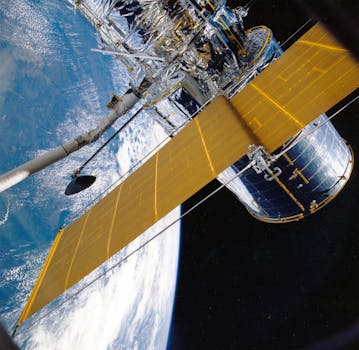Connecting the Globe: The Impact of Orbital Technology on Global Communication

Connecting the Globe: The Impact of Orbital Technology on Global Communication
Orbital technology has revolutionized global communication, bridging the gap between nations and fostering international collaboration. The advent of satellite connectivity has enabled people from all over the world to stay connected, access information, and conduct business seamlessly. In this article, we will explore the impact of orbital technology on global communication, its benefits, and its future prospects.
Introduction to Orbital Technology
Orbital technology refers to the use of satellites and other space-based systems to provide communication services. Satellites in orbit around the Earth can transmit and receive data, voice, and video signals, enabling global communication. The first satellite, Sputnik, was launched in 1957, and since then, thousands of satellites have been launched into orbit, providing a wide range of communication services.
Today, orbital technology is used in various applications, including television broadcasting, telephony, internet connectivity, and navigation. Satellites are also used for scientific research, weather forecasting, and Earth observation. The use of orbital technology has transformed the way we communicate, access information, and conduct business.
The Impact of Orbital Technology on Global Communication
The impact of orbital technology on global communication has been significant. Satellites have enabled people from all over the world to stay connected, access information, and conduct business seamlessly. The use of orbital technology has bridged the gap between nations, fostering international collaboration and promoting global understanding.
One of the most significant benefits of orbital technology is its ability to provide communication services to remote and underserved areas. Satellites can reach areas where traditional communication infrastructure is lacking, providing people with access to vital services such as healthcare, education, and emergency services.
Benefits of Orbital Technology
The benefits of orbital technology are numerous. Some of the most significant advantages include:
Global coverage: Satellites can provide communication services to any point on the globe, regardless of the location.
Reliability: Satellites are less prone to outages and disruptions compared to traditional communication infrastructure.
Security: Satellites can provide secure communication services, making them ideal for sensitive applications such as military communications and financial transactions.
Cost-effectiveness: Satellites can provide communication services at a lower cost compared to traditional communication infrastructure.
Conclusion
In conclusion, orbital technology has revolutionized global communication, bridging the gap between nations and fostering international collaboration. The use of satellites has enabled people from all over the world to stay connected, access information, and conduct business seamlessly. As technology continues to evolve, we can expect to see even more innovative applications of orbital technology in the future.




